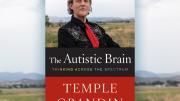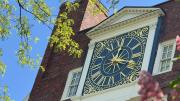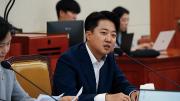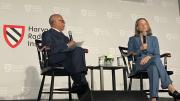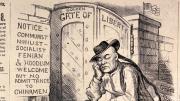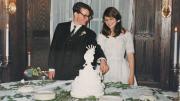For self-described “geeky kid” Temple Grandin, horseback riding, electronics, and the model-rocket club were what gave her an outlet for expression when she went to boarding school: the things that allowed her to make friends and escape teasing from other students. Those activities, Grandin said yesterday at Harvard’s Graduate School of Education, together with her parents’ ability to recognize and encourage her innate visual talents, enabled her—though diagnosed with autism at the age of two—to live a life not defined by her condition.
Grandin, who was portrayed by Claire Danes in an Emmy-winning HBO movie, is a professor of animal science at Colorado State University and the author of a new book, The Autistic Brain: Thinking Across the Spectrum. Standing at the podium in Longfellow Hall, she discussed her insights that have led to dramatic improvements in the livestock industry, as well as why she believes the world needs many different types of thinkers. It is these different types of thinking—mathematical, visual, and language-based—that must come together, she explained, in order to solve problems and successfully accomplish tasks.
One of the keys to cultivating this, Grandin said, is to build on a child’s strengths. In Grandin’s case, it became very obvious in the third grade that she was exceptional at art; for hours on end, she simply drew horse heads. Her parents, recognizing her artistic skills, encouraged her to draw other things. Grandin—who didn’t speak until she was almost four—said this type of reinforcement led her eventually to conceptualize the intricate details involved in designing a humane livestock-restraint system now used on nearly half the cattle in the United States.
“You want to take that thing that the child is obsessed with and broaden it out,” she said to a packed audience of faculty members, students, and staff members. “A lot of kids today draw anime characters, and I’ll say, ‘Why don’t you draw his house, or his car, too?’ I think we need to be looking at the genetics of personality sort of like a music mixing board—you can adjust for more anxiety or less anxiety, more visual thinking or less visual thinking. [With] a lot of these different traits, there is no dividing line between normal and abnormal.”
The biggest innate difference between those with autism and those without it, Grandin said, lies in extreme ability and disability with certain skills. Grandin used her own struggles with math as an example, saying that she would have never have graduated from college had she had been forced to take algebra. The key, she said, is to recognize and cultivate talent, instead of focusing on what a child cannot accomplish.
“One of my big concerns is that a lot of brilliant minds get [mis]labeled,” she said. “People are just looking at the deficits, they are not doing anything to build up the talents. Kids that are good at math often have trouble with reading. This is where you can get uneven skills.”
Grandin said it was her brain—which she described as “an indexed visual search engine”—that helped her test-run the “livestock facility in her own head” before she even designed it. She also added that as someone with autism, she learned early on that selling her actual skills, as opposed to her social skills, was the key to professional success. “As a weird geek, you have to sell your skills rather than yourself,” she said. “I went to some of the very first agricultural engineering meetings and no one wanted to talk to me. But then I whipped out my drawings. I learned very early on that you never know where you are going to meet a person who will open the door to opportunity.”
Grandin also pointed out that even though early diagnosis of autism can lead to early intervention and access to special-education programs, it also means a permanent label that may ultimately impede the healthy development of a child’s identity. “These kids come up to me at autism conferences and all they want to talk about is their autism,” she said. “I want to talk to them about other things, like robotics, training dogs, or history. Don’t be defined by your condition.”
